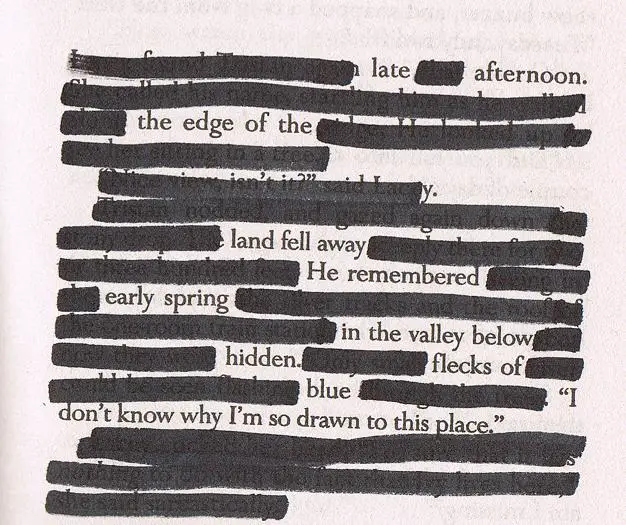I’m in a graduate school writing course right now that is changing the way I think about writing and authorship, especially for creative styles of writing such as poetry and narratives (and also my artsy-fartsy, arts-based qualitative research academic writing). I have seen the light and I don’t anticipate ever having writer’s block again, thanks to a few simple strategies.
If you’re specifically struggling with academic writer’s block in grad school, we’ll be doing a more focused piece on writer’s block in grad school for you soon. Please stand by.
As creative writers, we often wait to “be inspired” before we start writing… and we wait, and we wait, and we wait… to feel some kind of bolt of lightning revelation. But as I’m learning, sometimes ‘the muse is busy.’ She has a lot of people to visit! Therefore, we have to have reliable strategies to be able to inspire ourselves whenever WE want (or need) to write.
The best, simplest strategies I’ve learned to combat writer’s block and to never be at a loss for inspiration boil down to this:
1. Give yourself a specific writing constraint (linguistic, content, or context)
2. Write every day—With a strict deadline and make yourself accountable to a third party
3. Release yourself from all futile ideas of perfectionism! (It helps if you start to see yourself as a conduit rather than a source)
Waiting to “be inspired” is just our own fear of failure
Oulipo, a group of French writers and mathematicians in the 1960s, rejected the idea of random, chance writing inspiration and instead believed in writing from formal constraints in order to inspire our own creativity. One of the co-founders of this movement, Raymond Queneau, wrote,
“…the poet is never inspired, because he is the master of that which appears to others as inspiration. He does not wait for inspiration to fall out of the heavens on him like roasted ortolan. He knows how to hunt, and lives by the incontestable proverb, ‘God helps those who help themselves.’ He is never inspired because he is unceasingly inspired, because the powers of poetry are always at this disposition, subject to his will, submissive to his own activity…“
(Motte Jr., 36)
Isn’t that beautiful? I had to look up what a roasted ortolan is, though (don’t do it).

So why do some of us choose to wait for inspiration when we could just “help ourselves” as Queneau says to do? I think that waiting for inspiration to strike is just a manifestation of our own “fear of failure” as writers. We’re all scared of putting something into the world that will be critiqued and so we subconsciously refuse to inspire ourselves and place the blame on outside forces.
To combat our fears, we need simply (or not so simply—it is work) follow the strategies above (setting constraints, deadlines, and rethinking our visions of ourselves as writers—ditching the quest for perfection). If you live by these 3 practices instead of beating yourself up and agonizing over a lack of inspiration, you will be able to write endlessly every day without ever encountering the dreaded “writer’s block.”
What kind of writing can these 3 strategies be used for?
At the moment, I’m finding myself doing quite a bit of academic writing, informational/reporting-style writing (for Wayfaring Humans), and poetic and narrative writing for my current grad school courses. I’ve found thus far that these 3 strategies for combatting writer’s block work for all of them.
Whether you’re a writer of creative non-fiction, poetry, or you pump out multiple academic papers a year, the same fears can take hold—that what you’re going to write isn’t going to be ‘good enough.’ That your worth as a writer will be judged and questioned.
And because all of these forms of writing have the same limiting fear factors, they can all serve to benefit from these 3 strategies.
Strategy #1 – Limit yourself: Give yourself a writing constraint
A lot of successful writers don’t sit down with zero ideas and start writing something that’s amazing on a blank piece of paper through stream of consciousness… Or maybe some do, I don’t know. But for me, having a writing constraint is incredibly helpful in unleashing whacky and potentially interesting ideas.
It seems counterintuitive, I know. In order to be creative, constrain yourself? My professor asked us to note that the word is “constraint” and not “restraint.” There is always room for rule breaking here.
There are three kinds of constraints that you can use:
- a linguistics or form constraint;
- a contextual constraint; and
- a content constraint.
A linguistics constraint can be any sort of rule you give yourself about your writing. For example, you have to write ten lines and they all need to be in the third person. Or you have to write using only nouns. You have to make a poem that rhymes. Etcetera. It can be anything! If you can’t think of any, I’ll give you more examples below.
A contextual constraint means changing the context, situation, space, medium… that you normally write in. So, you might give yourself the constraint of writing only on a napkin and see what happens. Or typing your paper in an email instead of a word processor. Writing in a different room, in a different position… etc.
A content constraint is what we think of when we imagine our teachers giving us writing assignments as kids. “Write about what you did over the weekend.” It’s a prompt.
Sometimes this isn’t enough of a constraint for me. So, I might combine two of the three. Like, I have to write a haiku using magic markers while listening to top 40. Or something.
You can set any constraint or any combination of constraints that you want.

Why do this?
When you sit in front of your Word doc, or with a blank sheet of paper in front of you, the possibilities are endless.
Sometimes having so much freedom, so much room to write about anything, can actually be paralyzing rather than liberating. Why does something that should be good induce such anxiety?
I believe it’s because when we’re faced with so much choice, we don’t want to make the wrong decision. Our failures are made even scarier because we started off with so much choice… and we feel it is us alone responsible for making the wrong one.
It’s the famous paradoxical nature of choice, applied to writing.
Therefore, the solution is to create a superficial writing constraint for ourselves that we must work within. This takes away our choice (and some responsibility) at least at first—thus, truly liberating us… by shackling us. It’s weird.
But instead of being a limit to creativity, you’ll see that even within a constraint, the possibilities for showcasing your creativity are absolutely endless.
Start to think of writing as a selection process
Before starting my current grad school course, my idea of writing was that if I am an author, I have to grab an idea out of the sky and if I can’t think of ideas, I need to sit and think more… or I need to go out and have experiences that I can write about, or I have to read more to get inspired. These methods may work well for you. Great! But if not, they aren’t the only ways to come up with creative ideas.
There are many ways of creating our own “inspiration” from linguistics constraints and from using the texts that surround us (from traffic signs to travel brochures). What I’m learning is that writing is more of a SELECTION process—kind of like being a sculptor.
We can start by gathering anything and everything—all of the ideas and words and texts that surround us—we can mold them and delete the excess, and create something unique through careful curation.
If you’ve ever tried to write a haiku or a sonnet in iambic pentameter, following the syllable rules exactly, you already know what I’m talking about. You’re trying many things and making a somewhat systematic selection process before coming to something you like and keep.
Try one of these linguistics (or form) constraints for writing poetry!
As mentioned, a constraint can be anything. You can create the rule if you want. Here are some poetry constraints we tried in class that worked well for me. You can unblock yourself by starting with a poem and see what strange things you evoke:
Write a Scrabble Piece Poem
Pour your Scrabble (or Bananagram) pieces all over the floor. Start making words. The first words that pop out for you. Start connecting them. Make a phrase. Make a sentence. It will soon become a weird and awesome poem. Don’t forget to take a picture. And then start over until you have the kernel of an idea that resonates with you.

Write a Verb-Noun Cubic Poem
Write a poem that is 27 lines long. In each line, you can only have 3 words.
And each word that you choose must be able to serve as both a verb and a noun.
You can conjugate verbs and add plural “s” to words.
Suggestion: first make a long list of words that can be both verbs and nouns, and try to think of some good phrasal verbs that fit this description.
How will this help? You’ll be surprised at what comes up for you. This is a good kernel poem that can later be expanded upon, the phrases elongated into a more substantive poem or narrative. Here’s my example:
Bearing, stomaching,
masking
Fake guarded laugh
Gifted disguise master
Dropping down,
crashing
Black out punch.
Damned hiccupping pain
Speared, gutted –
silenced.
Functioning Ghost nods,
Carries on smiling
Write a few of these! Keep your notes and word lists. They might serve as ‘inspiration’ for a future project. As my professor said, everything you write matters and is useful to you.
Write a Backwards Poem
Well, actually the poem will go forward. But the prose you write first will go backwards.
Here’s what you do. First, write a sentence—just a normal, boring prose sentence that sounds like it could have been taken from a text book. The content doesn’t matter.
Then think about the sentence that would come before that sentence… and write it before the first sentence that you wrote.
I’m about to write an example poem about Christopher Columbus for some reason. Apologies in advance…

So, for example, maybe my first sentence is:
In 1492, Christopher Columbus left Europe to sail toward the New World.
Next, I might write something like:
The ships were prepared and the crews were carefully selected. In 1492, Christopher Columbus left Europe to sail toward the New World.
Then, you write a third sentence. So, for example:
Queen Isabella and King Ferdinand decided to fund an expedition to the west in their name. The ships were prepared and the crews were carefully selected. In 1492, Christopher Columbus left Europe to sail toward the New World.
You are going to continue writing like this until you have about a paragraph. It’s really hard to write a sentence and then imagine the sentence that should come before it. This is because we are so programmed to write in a linear way. Normally, one sentence naturally follows another when we’re writing!
However, if you think about how we speak, it’s totally different—not linear at all. We often say a sentence, and then have to back up, talk about what happened before, return to our original point, jump around in time a few more times… oral storytelling in our daily lives is rarely linear.
We approach our writing differently than our speaking. Isn’t that interesting?
Next, you’ll use the prose that you have written (the one paragraph) to write a poem. Start with the first sentence of prose that you wrote. In the example, this sentence is “In 1492, Christopher Columbus left Europe to sail toward the New World.”
Choose three words from this sentence, going backward. These three words are the first line of your poem. You can conjugate the verbs if you want or add a plural “s.”
For example, my poem might start like this, with three words from my prose sentence (“In 1492, Christopher Columbus left Europe to sail toward the New World.”):
First line of my poem: World toward Christopher
Then, do the same with the second sentence of prose that you wrote. And the third, and so on. Following our short three-sentence example (Queen Isabella and King Ferdinand decided to fund an expedition to the west in their name. The ships were prepared and the crews were carefully selected. In 1492, Christopher Columbus left Europe to sail toward the New World.), the poem could be:
World toward Christopher
Carefully crews prepared
West expedition queen
And so on. The prose is written backwards and the poem progresses forward. In doing this, you’re challenging your brain’s normal instincts to write prose forward and you’re providing a simple poetry constraint for yourself. Make the prose and poem as long as you want.
Write a “Found Poem” or “Blackout” Poem

Take a newspaper or printed out article, or a page ripped out of a book… literally any text imaginable! We used an old spam email to write a bunch of poems. Black out or cross out all words you don’t want and keep the words you do want. Bam, you have a cool, interesting poem different from what the text was before.
Found poetry has been used by famous poets such as Maya Angelou to create beautiful works of art. However, it can also be affective for qualitive researchers in academic who may be struggling with writer’s block.
Professor Lynn Butler-Kisber (2002) at McGill University in Montreal said,
“Whether found poetry is used as a public form of representation or as an analytic tool within the inquiry process, it will bring the researcher closer to the data in different and sometimes unusual ways that can yield new and important insights.”
These are just a few examples. Like I said, there are a million constraints out there, and you can also come up with your own! Get to writing with whatever constraint you like, and see what whacky stuff comes out for you. Remember, everything you write, even if you think it’s total garbage, is important to the process of writing and discovering. It’s a good idea to document your process!
Strategy #2 – Write every day with a strict deadline and make yourself accountable to a third party
This is a biggie. Many people who suffer from writer’s block are not time-conscious enough. They are paralyzed by their fear of failure and worry that their writing won’t ever be as good as they want it to be. So, they either don’t start or don’t finish.
We’re our own worst enemy in this way. And often, writers get away with this kind of thinking (“I have writer’s block! I’m not inspired!” etc.) because we all have the false notion that inspiration comes from an outside force, as previously discussed.
This is why we have to be strict with ourselves, decide to WRITE EVERY DAY and give ourselves DEADLINES. There’s an old age called Parkinson’s law that says our work will take as long as the time that is allotted for its completion. In other words, if you have a month, your project will take one month. If you have one day, you’ll get it done in a day.
This is why deadlines are so very crucial for us!

Decide right now what your goal is. Do you want to write for 20 minutes a day? For 2 hours a day? How about at least 1,000 words a day for a book or an academic paper? Or one poem a day?
What is realistic for you? Think about it. Make sure your decision is actually doable with your schedule (this is my problem—I always feel that I’m too busy with full time grad school and work… but there’s always time) and make sure that you won’t be tempted to give up on it after a week.
Writing every day is important because learning to write is like exercising. It gets easier and easier once you’re in the habit—at least, it gets easier to avoid writer’s block.
Once you decide to write every day and you have a daily deadline for yourself, bring in a third party to hold yourself accountable. This step is going to require getting over another hurdle—letting go of perfectionism, which will be discussed in the next section.
Doing this all by yourself is setting yourself up for failure unless you have a will of steel. Let someone else (or the Internet) in.
A third party can come in different forms. You can of course just ask someone (a friend, colleague, partner) to play this role if you want. You have to tell them your goal and then send them your writing by a certain time every day.
Set up a system of consequences if you don’t reach your goal every day. For example, every day that you don’t send your writing to your friend, you have to donate $25 to a political candidate that you despise.
Another way to do this is to make yourself accountable to the Internet. Set up a Facebook page or blog where you post your work every day. This can be something you do yourself and invite some people to look at, or a communal activity if you have other grad school friends or writers who also want to be accountable to deadlines.
You’ll share your work even if it’s incomplete and you hate it. You got that crap out of your system! And you reached your daily writing goal. Tomorrow you’ll have another shot. Which brings me to…
Strategy #3 – Let go of your perfectionism

This is the most important one for me that I’m still trying to teach myself.
In doing the exercises described above (using constraints and forcing yourself to meet a deadline—thereby sharing your unfinished work!), you have a better chance of dealing with your destructive perfectionism.
Perfectionism is what has kept me up many nights in grad school and stressed me out beyond what is physically and mentally recommended.
And it’s not really all that helpful.
Perfectionism stems from the idea that you own everything you write and that you are solely responsible for it. It’s the thinking that what you write, your words, come from a mysterious place deep inside of you. But what if we were to think of ourselves as more of a vehicle of words than a source?
What if we saw all of our work as an unfinished experiment?
We would be free to play more, to try out weird sources of inspiration that we think are interesting… to live in a space where it’s okay that our writing is always going to be not quite ready and a work in progress… Even a piece that has been published in a book or fancy journal is never really, truly, ever finished.
Let’s say it together: Perfection doesn’t exist. How freeing!
When I started writing every day, with constraints and a deadline, I was released of much of my “perfectionist” tendencies. Not completely. I’m still working on it. But I feel a lot better.
It’s liberating to change the prevailing, society-accepted way that we think about authorship. You’re not so attached to your words this way. As people critique them, it’s okay. The words are in progress and they were a collaborative effort anyway—stemming from the assistance of text that you morphed, or a constraint that you employed. And not something that holds all of your worth and value as a person, writer, and professional.
To wrap up, remember these 3 strategies if you’re feeling writer’s block and start using them today:
1. Set a constraint of some kind
2. Write every day with a deadline and make yourself accountable to a third party
3. Abandon all perfectionist tendencies! Reframe your thinking of yourself as an “owner” of words to a “vehicle” of words.
Have fun with your writing!
Honestly, any strategies or conscious changes to your habitual way of thinking and doing should beat writer’s block. If you’re having difficulty starting an academic paper, try doing one of the suggested constraint poetry exercises on your topic and see if it doesn’t spark some ideas. Alternatively, just do a handstand, try writing in a different location, in a different medium… maybe simply try writing in a weird format like a PowerPoint slide instead of a Word document, and see if that tiny change from the norm doesn’t unblock something in your head.
Quote reference:
Butler-Kisber, L. (2002). Artful portrayals in qualitative inquiry: The road to found poetry and beyond. Alberta Journal of Educational Research, XLVIII(3), 229-239

